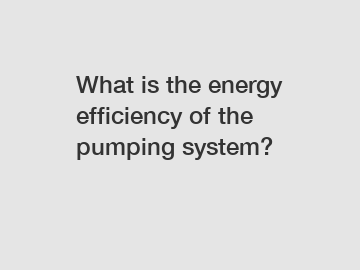What is the energy efficiency of the pumping system?
What is the Energy Efficiency of the Pumping System?
A pumping system plays a crucial role in various industries, including water management, oil and gas extraction, and manufacturing processes. Understanding the energy efficiency of such systems is vital as it directly impacts the overall operational costs and environmental footprint. In this article, we will explore the concept of energy efficiency in pumping systems, its importance, and some measures that can be taken to optimize energy usage.
Key factors affecting energy efficiency:

1. Hydraulic design:
The hydraulic design of a pumping system determines its overall efficiency. It includes considerations such as the selection of appropriate pump type, pipe size, and system layout. A well-designed system minimizes energy losses due to friction and pressure drops, improving overall efficiency.
2. Pump selection:
Choosing the right type and size of the pump is crucial for optimal energy efficiency. Different pumps have varying characteristics and efficiencies. It is essential to assess the specific requirements of the application and select a pump with the highest efficiency in that range.
3. Variable speed drives:
In many applications, the required flow and pressure vary throughout the operation. Using variable speed drives allows the pump to match the flow conditions, reducing energy consumption. These devices adjust the pump speed to deliver the required output, saving substantial energy over fixed-speed pumps.
4. System controls:
Implementing efficient control strategies can significantly enhance energy efficiency. Advanced control systems can monitor variables such as flow rate, pressure, and temperature, automatically adjusting the pump operation to optimize performance. By maintaining appropriate pressure levels and minimizing unnecessary pumping, energy wastage can be minimized.
Calculating Energy Efficiency:
The energy efficiency of a pumping system is typically calculated using the concept of pump efficiency. Pump efficiency is the ratio of the water power output to the shaft power input. It represents how effectively the pump converts input energy into output energy. Higher pump efficiency translates into lower energy consumption and reduced operating costs.
Improvement Measures:
1. Regular maintenance:
Performing routine maintenance and inspections ensures that the pumping system operates at optimal efficiency. Proper alignment, lubrication, and seal condition checks can prevent energy loss due to wear and tear. Regular maintenance also allows for early detection and rectification of issues, preventing severe breakdowns and further energy wastage.
2. Optimal pipe sizing:
Selecting the appropriate pipe size and layout is critical in reducing energy losses. Oversized pipes lead to pressure drops, while undersized pipes increase friction losses and require higher pumping energy. Proper hydraulic design and pipe sizing minimize energy wastage and enhance overall efficiency.
3. System audits:
Engaging in periodic energy audits is an effective way to assess the performance of a pumping system. These audits identify potential areas of improvement and provide recommendations for optimizing energy efficiency. By analyzing energy usage patterns, flow rates, and operating conditions, energy-saving opportunities can be identified and implemented.
Conclusion:
Energy efficiency in pumping systems is essential for reducing operating costs, minimizing environmental impact, and improving overall system performance. Hydraulic design, pump selection, variable speed drives, and efficient control strategies play vital roles in optimizing energy consumption. Regular maintenance, optimal pipe sizing, and system audits are additional measures to enhance energy efficiency. By continuously evaluating and improving these factors, industries can achieve significant energy savings while maintaining effective operations.
If you have any additional questions about the energy efficiency of pumping systems or need assistance in optimizing your system, please do not hesitate to contact us.
For more sanitary diaphragm pump manufacturer, air pump working principle, Pneumatic Piston Pumpinformation, please contact us. We will provide professional answers.


